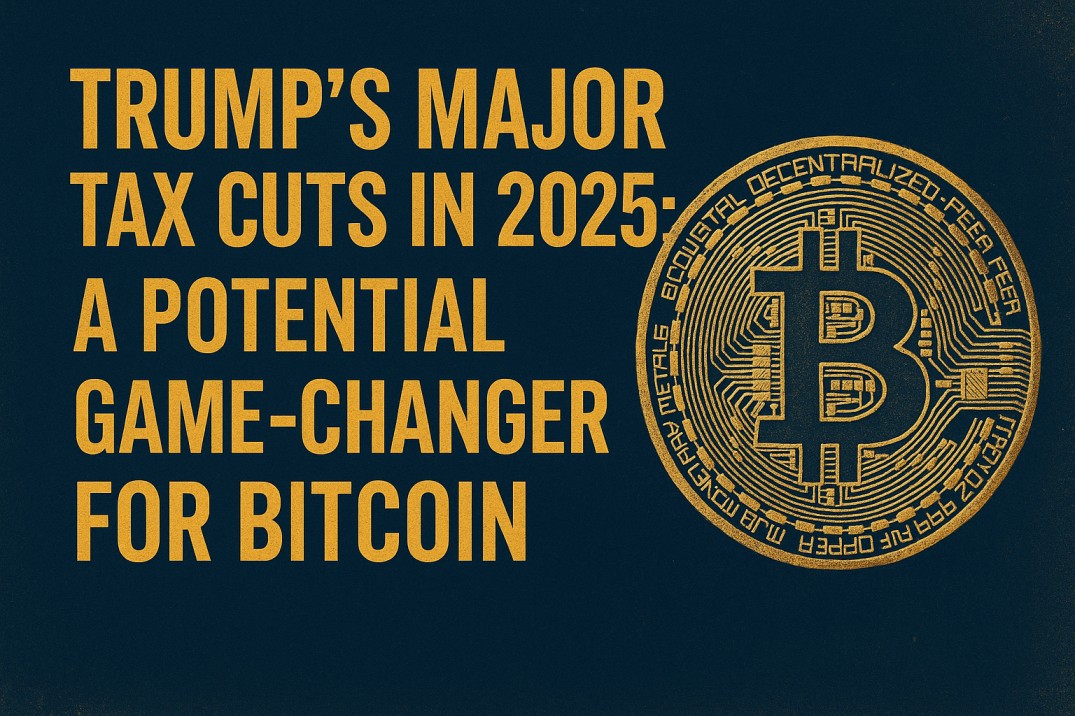On April 29, 2025, Trump administration officials announced plans for significant tax cuts, positioning them as a cornerstone of their economic strategy alongside trade reforms and deregulation to spur U.S. economic growth. This development has sparked widespread speculation about its potential effects on various markets, particularly the cryptocurrency sector, with Bitcoin at the forefront. As Bitcoin continues to solidify its place in the global financial landscape, these proposed tax cuts could have a profound impact on its adoption, price, and role in the U.S. economy. Let’s explore how this policy might influence Bitcoin and what it means for investors and the broader crypto market.
The Context: Tax Cuts as an Economic Catalyst
The Trump administration’s tax cut proposal builds on the legacy of the 2017 Tax Cuts and Jobs Act (TCJA), which slashed corporate tax rates and provided individual tax relief. The latest announcement emphasizes making the expiring provisions of the TCJA permanent while introducing new cuts, such as eliminating taxes on tips, overtime pay, and Social Security benefits for retirees. Additionally, there’s talk of reducing the corporate tax rate further for domestic production and potentially revisiting capital gains tax structures. These measures aim to put more money into the hands of individuals and businesses, theoretically boosting spending, investment, and economic activity.
However, the plan isn’t without controversy. Critics argue that the tax cuts, paired with Trump’s aggressive tariff policies—like the 25% tariffs on goods from Mexico and Canada and a 10% tax on Chinese products introduced earlier this year—could fuel inflation and increase the federal deficit. The Tax Foundation has warned that such tariffs could offset much of the economic benefits of the tax cuts by raising prices and inviting retaliatory trade measures. Meanwhile, the administration is exploring creative revenue sources, such as using tariff income to fund tax relief or even to bolster a Strategic Bitcoin Reserve, as suggested by Bo Hines, the executive director of the Presidential Council of Advisers on Digital Assets.
Bitcoin’s Rollercoaster Ride Under Trump
Bitcoin has had a volatile journey since Trump’s re-election in November 2024. Initially, the cryptocurrency soared, breaking $100,000 in December 2024, driven by optimism over Trump’s pro-crypto stance. He promised to make the U.S. the “crypto capital of the planet,” appointed crypto-friendly regulators, and even launched his own crypto venture, World Liberty Financial. The administration’s creation of a Strategic Bitcoin Reserve, initially stocked with seized tokens, further fueled market enthusiasm. However, the introduction of tariffs in early 2025 led to a sharp decline, with Bitcoin dropping to $88,190 by March 7, 2025, as investors feared tariff-induced inflation would deter the Federal Reserve from cutting interest rates, thus reducing appetite for riskier assets like Bitcoin.
Despite this setback, recent posts on X indicate a renewed bullish sentiment. Users have noted that Trump’s policies, such as providing power plants for Bitcoin miners and classifying Bitcoin as a commodity, are driving institutional interest and positioning the U.S. as a global leader in the crypto narrative. This backdrop sets the stage for understanding how the newly announced tax cuts might influence Bitcoin.
How Tax Cuts Could Impact Bitcoin
- Increased Disposable Income and Investment in Risk Assets
The proposed tax cuts are expected to increase disposable income for individuals and businesses. For the average American household, this could mean an additional $3,300 to $5,000 in take-home pay annually, according to estimates from the Council of Economic Advisers. With more money in their pockets, investors might allocate funds to riskier, high-growth assets like Bitcoin. Historically, Bitcoin has been viewed as a hedge against inflation and a store of value, especially during times of economic uncertainty. If the tax cuts stimulate spending and investment as intended, Bitcoin could see a surge in demand, potentially driving its price higher. - Potential Capital Gains Tax Reform
One of the most intriguing possibilities is the administration’s consideration of eliminating capital gains taxes on U.S.-based cryptocurrencies, a proposal floated at the March 7, 2025, Crypto Summit. Currently, Bitcoin is treated as property under U.S. tax law, meaning any gains from its sale are subject to capital gains tax—up to 20% for long-term gains, plus a 3.8% net investment income tax for high earners. Removing this tax burden could incentivize more Americans to buy, hold, and use Bitcoin for everyday transactions, addressing a key frustration Trump himself has voiced: “Bitcoin is money, and you have to pay capital gains tax if you use it to buy a coffee?” Such a policy would likely lead to a significant influx of capital into Bitcoin, as investors seek tax-efficient assets. However, some X users caution that this could disrupt traditional markets, with capital flowing out of stocks and bonds into Bitcoin, potentially causing a “severe shock to the system.” Analysts also warn of increased market volatility, as investors might sell non-U.S. crypto assets to focus on tax-exempt U.S.-based tokens, and a surge in new cryptocurrency creations within the U.S. could further complicate the market dynamics. - Boost to Crypto-Related Businesses
Lower corporate taxes, especially for domestic production, could benefit U.S.-based crypto firms, including exchanges like Coinbase, mining companies like Mara Holdings, and blockchain startups. Reduced tax burdens might encourage these companies to expand operations, invest in innovation, and create jobs, further solidifying the U.S. as a hub for crypto activity. Additionally, Trump’s policies to support Bitcoin mining—such as providing access to power plants and fast-tracking permits—could lower operational costs for miners, making Bitcoin mining more profitable and potentially increasing the network’s hashrate. This, in turn, could enhance Bitcoin’s security and attractiveness to institutional investors. - Counteracting the Tariff Effect
The tariffs imposed earlier this year have been a double-edged sword for Bitcoin. While they’ve raised concerns about inflation and reduced risk appetite, leading to a 10% price drop since the global tariff announcement on April 7, 2025, the tax cuts could counteract some of these negative effects. By increasing disposable income and potentially reducing capital gains taxes, the tax cuts might restore investor confidence in Bitcoin, encouraging them to view it as a hedge against tariff-induced inflation rather than a risk asset to avoid. Moreover, the administration’s plan to use tariff revenue for tax relief or to buy Bitcoin for the Strategic Bitcoin Reserve could create a direct link between trade policy and crypto market support, potentially stabilizing Bitcoin’s price.
Risks and Challenges
While the tax cuts present opportunities for Bitcoin, they also come with risks. First, the fiscal impact of the tax cuts could exacerbate the U.S. federal deficit, already a concern after the TCJA added nearly $2 trillion to the deficit by 2028. A larger deficit might lead to higher interest rates, which could dampen enthusiasm for non-interest-bearing assets like Bitcoin. Second, the interplay between tax cuts and tariffs remains a wildcard. If tariffs continue to drive inflation and push the economy toward a recession, as some economists fear, Bitcoin might suffer alongside other risk assets, despite the tax incentives.
Additionally, the proposal to eliminate capital gains taxes on Bitcoin faces legislative hurdles and concerns about wealth inequality. Critics argue that such a move would disproportionately benefit wealthy investors, potentially widening the wealth gap. There’s also the risk of regulatory overreach—if the government becomes too involved in the crypto market through initiatives like the Strategic Bitcoin Reserve, it could stifle innovation or lead to price manipulation.
The Bigger Picture: Bitcoin’s Role in the U.S. Economy
The Trump administration’s tax cuts underscore a broader shift in how Bitcoin is perceived in the U.S. No longer a fringe asset, Bitcoin is increasingly seen as a strategic tool for economic growth. With over 52 million Americans owning some form of cryptocurrency, according to the Stand With Crypto Alliance, and 45% unwilling to support candidates who oppose crypto innovation, the political stakes are high. Trump’s policies reflect a desire to harness Bitcoin’s potential to drive innovation, create jobs, and position the U.S. as a global crypto leader.
However, the administration must tread carefully. While tax cuts could turbocharge Bitcoin’s adoption, they must be balanced against the economic realities of inflation, deficit growth, and global trade dynamics. For now, the crypto community is watching closely, with many on X expressing optimism about Bitcoin’s resilience and potential for growth under Trump’s economic agenda.
Conclusion
The Trump administration’s major tax cuts announced on April 29, 2025, could be a significant catalyst for Bitcoin, potentially driving its price and adoption to new heights. By increasing disposable income, reducing tax burdens on crypto gains, and supporting crypto-related businesses, these cuts might create a fertile environment for Bitcoin to thrive. However, the interplay with tariffs, inflationary pressures, and fiscal challenges introduces uncertainty. For Bitcoin investors, the coming months will be a critical test of whether Trump’s economic vision can deliver on its promises—or if it will be derailed by the very trade policies meant to fund it. As the U.S. navigates this complex economic landscape, Bitcoin remains at the forefront of a rapidly evolving financial frontier.








